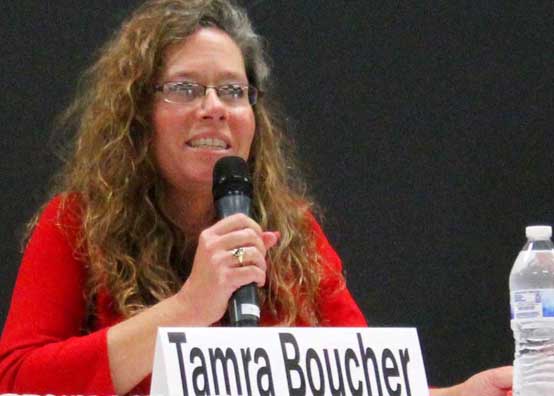By HOLLY
GASKILL
Republican Primary candidates for County Commissioner in District 3 had no shortage of pressing issues during a forum Monday, addressing the Health Department, solar energy, economic development, and a prospective State Road 1 project.

Incumbent Jeff Stringer is challenged by Tamra Boucher for the position. Stringer was elected to the role by caucus in 2021 and currently serves as the board’s president. Rick Johnloz moderated the “Meet the Candidates” forum, which contained four questions determined by the legislative committee of the Wells County Chamber of Commerce.

First on the docket was the future of the Health Department and Health First Indiana. In the last year, the health department has experienced a near-complete turnover of its staff, including its health officer. Wells was also one of six counties not to join the Health First Indiana program, which could have provided additional funding to the Health Department.
Stringer said the department had been a toxic workplace without leadership who were willing to “step up.” Stringer said he had intervened to bring back Marlene Hoag, previous department administrator, and Ryan Bennett, who had resigned as an environmental specialist. Because of this, and his reluctance to flippantly take taxpayer money, Stringer was against HFI in 2023. However, he expressed an openness to joining the program this year, saying he had spearheaded planning this year.
Boucher said from her perspective, it seemed like there was a massive hole in the department when Hoag had retired, as well as numerous communication issues.
“I think there were a lot of things there that escalated beyond where they needed to escalate,” Boucher said. “I don’t think it’s fiscally responsible that we’re paying for two local health officers right now,” she added, referring to the agreement reached between the county and former health officer Dr. Kay Johnson for her resignation.
Boucher also indicated her support of HFI.
Both Stringer and Boucher then demonstrated their opposition to industrial solar energy.
“My opinion on something is irrelevant when the community speaks up,” Boucher summarized. “Often what happens is we trust our elected officials, right? We vote for our people, we put them in office, we expect that they’re going to do the right thing, and then we go on with our lives and don’t really pay attention. And then something happens … So when people do speak up, that’s when, as an elected official, you have to listen to them.”
Boucher indicated that the project never should have received approval for a tax abatement or road use and decommissioning agreements, since both conflict with goals outlined in the county’s Vision 2035. Stringer, however, said that these agreements were in negotiation “long before” the plan was approved.
Stringer also said when those had been approved, he had been assured the company was very early in the process. Even if the commissioners would approve the company’s recent zoning petition, Paddlefish Solar would still have to submit a development proposal.
That said, Stringer said he’s consulted with a number of those involved and affected and was against the development. He also did not like that the company was French-owned and the solar panel manufacturer was reportedly Canadian and Chinese-owned. “Zero solar,” he concluded.
Regarding economic development, Stringer said he was the driving force in asking for transparency from the Chamber of Commerce because of the county’s investment. “I never wanted him (Chad Kline) to leave. I still don’t want him to leave. But if accountability and fiscal responsibility scares you, then maybe he should leave.”
Stringer said that the county now has new opportunities with the Economic Development Commission and supports the idea that everybody in the community supports job creation and growth.
Boucher then referenced a discussion during the commissioners’ meeting two hours earlier, where the board discussed creating a new nonprofit for economic development. “And I sat there thinking, ‘That’s kind of like what we had already’ — except for we already had the mechanism in place … It was a private-public partnership that I believe is important when we talk about developing the community.”
Boucher said the partnership was a model for other communities and, while private businesses do create jobs, offered a point person to coordinate efforts.
Lastly, the candidates gave their opinions on the potential four-lane expansion of S.R. 1. Boucher advised she wanted to encourage cooperation between all parties to provide the best outcome. She also wanted to see a clearer database on all roads and bridges. Stringer mentioned similar points, saying he wanted a comprehensive plan for all road improvements.
holly@news-banner.com



